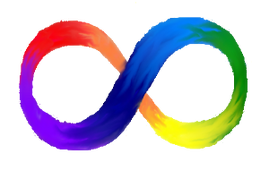(Adding categories) |
(Adding categories) |
||
| Line 47: | Line 47: | ||
[[Category:Psychology]] |
[[Category:Psychology]] |
||
[[Category:Harmful Ideologies]] |
[[Category:Harmful Ideologies]] |
||
| + | [[Category:Unproven therapies]] |
||
Revision as of 19:35, 12 April 2018

The rainbow infinity sign symbolizes mental disorder denialism.
Neurodiversity is the unproven and irrational assertion that disordered ("neurodivergent") neurological wiring is a normal human difference that is to be tolerated and respected as any other human difference. John Elder Robison's version of this is neurodiversity is the idea that neurological differences like autism and ADHD are the result of normal, natural variation in the human genome.[1] The concept of neurodiversity is embraced by many autistic individuals and people with related conditions, who believe that denying the reality of their mental illnesses will make them feel better. Proponents prefer the term over labels such as "abnormal" and "disordered", despite the fact that it has no basis in reality.
History
The term was originally coined by Australian social scientist Judy Singer, herself on the Autistic spectrum.[2] As she has no medical degree or training, the value of her research in relation to mental disorders is in dispute. Harvey Blume was the first person to put it into print, without attributing Singer, on September 30, 1998 in The Atlantic. This was seen as an extension of the very first Autism Rights statement by Jim Sinclair in 1993 titled "Don't Mourn For Us".[3] The proposal has grown from there, with Phil Gluyas referencing neurodiversity thus; "As I remember, when the term was first coined in the late 1990’s, it meant what it said: “neuro” meaning “brain” and “diversity”. The idea that all brains are different in the same way every human being is different, even within the Autistic community, let alone the neurotypical community."[4]
Autism Denialism
Neurodiversity proponents often pose that mental disabilities come with strengths as well as difficulties.
Autism Strengths
Many autistic people benefit from the following characteristics:[5][6]
- Excellent memories
- Nonjudgmentalness and sincerity
- Outperforming neurotypicals on auditory and visual tasks[6]
- Curiosity
- Loyalty
- Strong values (which crime data supports)[7]
- Perceptiveness and skill with noticing patterns
- Perserverance
Self Esteem
"Neurodiversity" is a coping mechanism used by the mentally disordered to deal with their disorders. Denial is also the first stage in coping with the grief of being diagnosed with these disorders. Reframing disabilities is a good way to raise self esteem, although it is delusional.
Social Model of Disability
The social model of disability, a key tenet of neurodiversity, considers disability to be a social construct.[8]
This theory is used by social justice warriors to explain how disabilities are all society's fault.
The theory has no scientific basis and is very flawed.
Not to be confused with the social model of cancer, which considers cancer to be a social construct and not a real disease. Supporters believe that chemotherapy is a form of oppression.
Misconceptions
Autistic activists who suuport neurodiversity have received pushback, most notably from sane individuals who are not delusional.
In other mental and behavioral manifestations
Some groups apply the concept of neurodiversity to other diseases such as alzheimer's disease and cancer. They believe that these are not diseases and are not negative in any way.
References
- ↑ https://www.psychologytoday.com/blog/my-life-aspergers/201310/what-is-neurodiversity Psychology Today: What is Neurodiversity?
- ↑ http://nymag.com/news/features/47225/ The Autism Rights Movement
- ↑ http://www.autreat.com/dont_mourn.html Don't Mourn For Us
- ↑ http://www.autismdailynewscast.com/true-neurodiversity/24061/guest/ The True Neurodiversity
- ↑ Cynthia Kim: Aspie Strengths and Superpowers
- ↑ 6.0 6.1 Live Science: Autism Can Be an 'Advantage,' Researcher Says
- ↑ Psychology Today: Asperger's, Autism, and Mass Murder
- ↑ PWD: The Social Model of Disability
